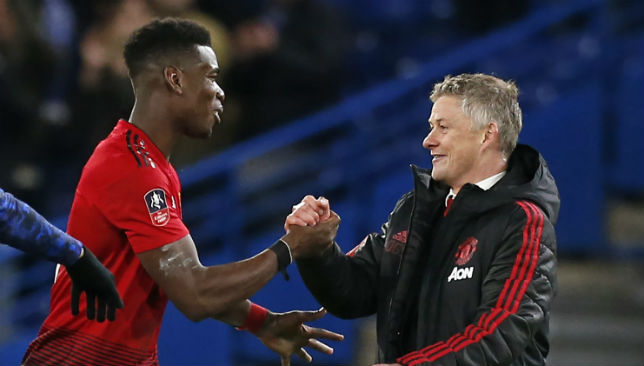
Score another win for player power. Manchester United have made another managerial decision based on the sentiments of their dressing room. Paul Pogba, having spoken publicly about who he feels deserved the job, has gotten his way, again, as have his team-mates.
Ole Gunnar Solskjaer has been named permanent manager at the club. Somehow, player power is never considered when the outcome being discussed is a positive one. Players can drive a manager out of a club, but not keep one, apparently.
Make no mistake – Solskjaer has been appointed because of the results he’s delivered since taking over as interim manager following the sacking of Jose Mourinho in December. Fourteen wins in 19 games overall, which includes the best start in Premier League history.
Six straight wins followed by a draw from his first seven games, eclipsing the record set by Carlo Ancelotti and tied by Pep Guardiola, who both lost their seventh game in charge of their new clubs – Chelsea and Man City respectively – after reeling off wins in their first six games. United have more points in the league than any other team since Solskjaer took charge.
And, of course, there was that night in Paris, when United rolled into Paris Saint-Germain‘s stadium with 10 first-team players out injured or suspended and won 3-1 to become the first team to progress from a Champions League knockout tie after losing the first leg at home by two or more goals.
Solskjaer has, also, done a great job with the players, bringing some of United’s freer spirits out of their shells after they chafed under Mourinho’s rigid, disciplinarian tactics.
One could even say he’s empowered them. Allowed to attack and express themselves, players like Pogba, Marcus Rashford, Anthony Martial and Romelu Lukaku have thrived, while midfielders Nemanja Matic, Ander Herrera and, most recently, Fred, have seen upturns in their individual form.
Paul Pogba 📈
— Football on BT Sport (@btsportfootball) March 28, 2019
Marcus Rashford 📈
Romelu Lukaku 📈
Ole Gunnar Solskjaer has been getting the very best out of his main men at Old Trafford 🔥 pic.twitter.com/Hta4HNylbB
Results matter. But that maxim works both ways. Few managers will keep their jobs if results aren’t going their way, even if the players are behind them. In Mourinho’s first spell at Chelsea, he had such loyalty from his squad that even when he left early in the 2007/08 season, his fourth at the club, his players would spend years extolling the virtues of their departed coach.
Mourinho’s relationship with Chelsea owner Roman Abramovich had deteriorated, and that contributed heavily to his departure, but so did a loss to Aston Villa and embarrassing Champions League draw at home against Rosenborg, coming after a season in which they’d relinquished the Premier League title to United having won it two straight years before that.
Look at Antonio Conte’s exit last summer. His tactics were no different than the previous season, when he’d won the league with Chelsea, but as soon as results went south, the reports came of players being disgruntled with their manager’s methods. Similar stories can be told about Arsene Wenger’s protracted Arsenal exit or Mourinho’s second departure from Chelsea.
Brendan Rodgers came close to winning the league with Liverpool in 2013/14, and was out by 2015 without his relationship with the players having demonstrably worsened. But results had.
At United this season, Mourinho – who let’s not forget, is the man who brought Pogba back to the club, and the duo celebrated their 2017 Europa League triumph with a warm embrace and defiant shouts – wasn’t able to get the levels of performance that Solskjaer has coaxed out of the same set of players.
Some grumbled privately about the style of football they were being asked to play, and Pogba took that criticism public after a 1-1 draw with Wolves at home, saying his team should attack more in front of their own crowd.
🗣 Pogba: “We have a coach that values us, a really happy coach. He's given confidence back to the players.
— Goal (@goal) March 28, 2019
“He gives freedom to play football again. Maybe we lost that before.
“The first day he arrived he just told us to enjoy playing football again." pic.twitter.com/emfSJVVnIG
So what caused Mourinho’s departure? Is it that the players turned on him, or that he took a team from second place to sixth in the span of eight months?
Results and squad morale go hand in hand. Even if players don’t like a manager, if they’re winning, they can put that aside – again, Mourinho and Conte are prime examples.
But very rarely does morale not drop in a losing team, and once that happens, a conflict can easily arise between players and manager. Clubs are forced to choose, and managers are easier to replace than players.
Similarly, interim managers can be appointed full-time because they’re winning and that makes players happier, more driven, and less likely to question their boss’ methods.
So if Pogba and company took the blame for Mourinho’s sacking, are they going to get any credit for Solskjaer’s appointment?